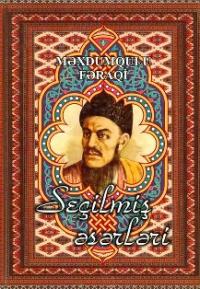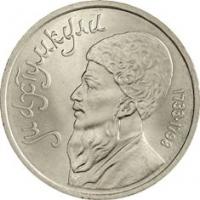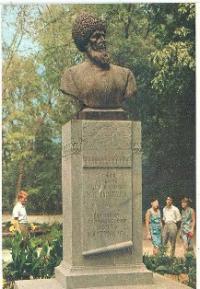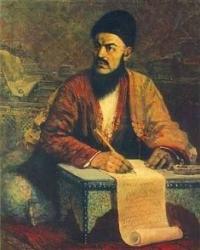You are here
Great Makhtumkuli.





Outstanding people of Turkmenistan.
"He will not despair, and will not lose on the battle day,
He will not be swayed by curses or the evil,
Will not separate from its nightingale and fade,
The Turkmen rose will forever blossom"
Magtymguly Pyragy Turkmen: Magtymguly Pyragy; 1724 – c. 1807) was a Turkmen spiritual leader and philosophical poet who made significant efforts to secure independence and autonomy for his people in the XVIIIth century.
Magtymguly is widely believed to have been born in the Hajygowshan village near Gonbad-e Qabus city in what is now the Iranianprovince of Golestan, the northern steppes of which are known as Turkmen Sahra ("Turkmen steppes"). In his poetry, Magtymguly says “Tell those who enquire about me that I am a Gerkez, I hail from Etrek and my name is Makhtumkuli,” identifying his homeland as the banks of the Etrek River and expressing his identity through his tribe.
He received his early education in the Persian and Arabic languages from his father Döwletmämmet Azady, a leading scholar at that time. He went on to study in various madrassahs, including the Idris Baba Madrassah in the village of Gyzyl Ayak, the Madrassah of Shir Gazi Khan in Khiva, and may have also studied in Bukhara for some time.
Upon his return home, Magtymguly worked as a silversmith while he taught and wrote. He went on to develop a realistic style of writing about XVIIIh century Turkmen that proved very popular and ultimately led to him becoming one of the most cherished Turkmen poets of all time.
He was also a devout naqshbandi Sufist who was said to have traveled throughout all the lands comprising modern Turkmenistan, teaching and praying for the salvation of his people. Not much is known about Magtymguly's family life.
He was unable to marry Mengli, the woman that he loved, yet it seems he was married to someone else. His elder brothers Abdulla and Mahammetsupa disappeared, and his children died young. Magtymguly was also pained by the loss of his father, with whom he had maintained close scholarly relations throughout his life.
Some of Magtymguly's poetry, along with stories collected from Turkmen oral traditions, suggest that the poet was taken prisoner at some point in his lifetime, likely in Mashad, Iran. It is unknown who took him captive, yet such events were common in XVIIIth century Iran and Turkmenistan.
A servant of the ruler, who was also a Turkmen, allegedly aided Magtymguly's escape. Pyragy is buried in Aktokay village in north-eastern Iran. The Iranian government has inaugurated a mausoleum on his grave.
He promoted the idea of keeping the Turkmen-way sacred, as well as maintaining the unity and integrity of the Turkmen nation. During his lifetime, his efforts had minimal success overcoming the existing tribal loyalties and rivalries.
The Turkmen tribes of the XVIIIth century were torn by internecine strife and the aggressions of powerful neighbors. Much of Magtymguly's poetry depicts the suffering of the common people as caused by the selfish predations of those in power.
Magtymguly also criticized rulers and many religious figures for their exploitation of the poor and their mockery of justice in such stanzas as: “Khans of Gokleng have been spoiled/They think we do not deserve any comfort.
They took away all our belongings/ We could not do anything but watch them,” and “Rulers dispense no justice anymore Muftis issue justice for a farthing. Magtymguly was one of the first Turkmen poets to introduce the use of the classical Chagatai, the court language of the Khans of Central Asia, as a literary language, incorporating many Turkmen linguistic features.
As such, his poetry exemplifies a trend towards increased usage of Turkic languages (as opposed to Persian), and Magtymguly is revered as the founder of Turkmen poetry, literature, and language. Magtymguly is widely revered as holy among Turkmen communities, and his poems are often quoted as proverbs in Turkmen society.
Magtymguly made wide use of the qoshuk form of poetry, which features prominently in Turkmen folk songs and is easily adapted to Turkmen musical forms. The qoshuk form consists of quatrains with lines consisting of eight or eleven syllables, and follows a rhyming scheme of ABCB for the first stanza and CCCB, DDDB, etc. for the following stanzas.
The compatibility of Magtymguly's poems with traditional musical forms allowed them to be easily adopted by bakhshis, traditional singers. Magtymguly's first poem, “By night when I was asleep... Revelation”, was composed following an incident when Magtymguly was a young boy.
His parents were attending a wedding, but Magtymguly was sleeping, and they left him behind. As he slept, he began to foam at the mouth, and his parents were called back to the house. When his father awoke him, Magtymguly recited his first poem.
Additionally, one of Magtymguly's poems recounts a dream in which Omar Khayyam bestowed upon him the gift of poetic invention. His poetry is often highly personal, but also takes up universal themes. His work includes elegies on the deaths of his father and children and the disappearance of his brothers, incitements to Turkmen unity, tirades against unjust mullahs and khans, praises of religious figures (such as the Twelve Imams), and laments at losing his beloved to another.
On one occasion, Magtymguly's village was raided, and his possessions, including manuscripts of his poetry, were carried away on a camel. The camel slipped, spilling the manuscript into the Etrek River. Upon seeing this, Magtymguly composed the following lines:
“Flood took my manuscript, thus leaving me behind with tears in my eyes.” The poem also contains the lines “Making my dear life lost to all that's good, / An evil fate wrought awesome sacrilege / Hurling the books I'd written to the flood.
To leave me bookless with my grief and rage.” Though Magtymguly apparently recorded much of his poetry, none of the original texts are currently known. A handful of manuscripts' existence is chronicled by scholars working under the Russian Empire.
However, following the Bolshevik Revolution in 1917, Soviet policy regarding anything written in the Arabic script as religious led to the destruction of many of these manuscripts. Many Turkmen who possessed manuscripts buried them while fleeing the Soviet Union to Iran.
Magtymguly's most famous poem among the 1.3 million Iranian Turkmen is "Türkmeniň" (of the Turkmen). The poem concerns the geography of the Turkmen people, and it sings praise for their culture. The poem became a rallying cry for Turkmen independence during the Iranian Revolution.
The poem can be read aloud or sung in groups. The Iranian Turkmen dialect is closer to Turkish, so they refer to the poet as "Mahtumkulu Firaki."
In between the Amu-Darya and the Caspian sea,
The wind of the Turkmen expands from the desert.
The bud of a flower- the blackness of my eye
From the dark mountains comes the flood of Turkmen.
The Almighty blessed this land. His shadow is present.
A sandstorm in its desert, a white camel,
Color upon color of blooming flowers on the green plains,
The Turkmen desert has drowned into basil.
Its beautiful woman will come out covered in green,
The smell of Amber will spread,
Bey, Honor, the White-bearded(elder) is the owner of the yurt,
The beautiful land of the Turkmen catches the colt.
He is the son of a brave man, his father is valiant,
Görogly is his brother, drunk is his head,
If the hunters chase him in the mountains and valleys,
The lion son of Turkmen cannot be caught alive
Hearts, souls and the heads unite as one,
If it draws deep, the lands and rocks will melt
If the food is ready on one dinner table
It will raise the fate of the Turkmen
His soul will fly when on horseback,
The mountains will turn to lava upon his glance,
When the river flows, it brings honey,
The dams will not hold the flood of Turkmen.
He will not despair, and will not lose on the battle day,
He will not be swayed by curses or the evil,
Will not separate from its nightingale and fade,
The Turkmen rose will forever blossom.
The clans are brothers, and the tribes are friends,
Their fates are tied, by the light of God
When the brave get on horses, it's for the battle,
The paths of the Turkmen lead to its enemies.
He will come out like drunk (fervent, mad), will not despair,
He will move mountains, his path will not be blocked,
My eyes will not gaze away, and the soul will not muse,
Magtymguly speaks the language of the Turkmen.
Authority:
https://en.wikipedia.org







